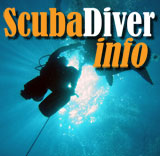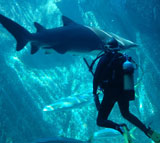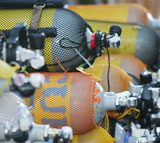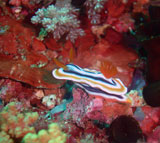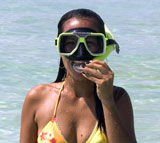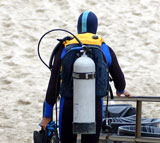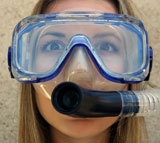Diving Safety
by Carol Cotton Walker
Remember what mom always told you? Wash your hands before you eat! Look both ways before you cross the street! Don't run with scissors. Eat your vegetables. Don't get in a car with a stranger! Don't lean back in your chair. Brush your teeth!! Always wear your seatbelt.
All the rules our parents taught us when we were kids were to help keep us alive. Everything we do in life has risks. We learn from an early age that knowledge and prevention are musts in survival. That certainly is true in scuba diving as well. Your Beginning Scuba course should have covered hours of safety issues, plus lots of practice of skills in confined water before you were evaluated in an open water environment. Below is a list of Don'ts, or rules, for scuba diving safely.
- Don't dive alone.
- Don't hold your breath.
- Don't ascend faster than your smallest exhaled bubbles.
- Don't stay down too long.
- Don't dive too deep.
- Don't dive with malfunctioning equipment.
- Don't destroy the environment.
- Don't plan a decompression dive as a recreational scuba diver.
- Don't go in overhead environments.
- Don't dive beyond your training.
- Don't forget your safety stop.
- Don't forget to log your dives.
Okay, so now we know the Don'ts. Lets turn them into Do's!
Don't dive alone
For starters, choose a buddy whose skills and training are similar to your own. Spend time learning how each of you dives and how you'd each handle emergency situations. Practice safety procedures and stay current with such skills as air sharing, locating a lost buddy, first aid and CPR procedures.
All that said, training agencies have begun offering solo diver certifications for suitably trained and experienced divers. That's because some divers, such as underwater photographers or videographers, may need the extra freedom that comes with diving solo. Qualification for solo driver courses, however, include a minimum age, proof of scuba experience, and in some countries a certificate of medical fitness.
Don't hold your breath
Always breathe as normally as possible to avoid the potential of lung over-expansion injuries. Delaying exhaling while ascending can cause damage to the alveoli in your lungs, and can therefore cause severe lung injury, and in extreme cases, death. Also remember to exchange carbon dioxide for good clean air by breathing deeply and slowly. Our bodies demand oxygen for survival, but as you know too much of anything can be bad. Too much oxygen can cause Oxygen Toxicity, too much nitrogen can cause Narcosis or even Decompression Sickness, and too much carbon dioxide can cause toxicity, as well. All of these problems can be avoided.
Don't ascend faster than your smallest exhaled bubbles
Ascend slowly to rid your body of unwanted nitrogen that has collected in your bloodstream and body tissues. Ascend slowly and enjoy the scenery! Many creatures life in shallower depths and are often overlooked on the descent, so take your time and enjoy them on the way back up!
Don't stay down too long
Remember to plan your dive and dive your plan. There's nothing down there that's worth running the risk of running out of air or having issues with residual nitrogen after the dive. In recreational diving, observe remaining bottom time on your dive computer, and also follow the captain's or divemaster's rules if on a dive trip. Don't end the dive with less than about 500 psi in your tank.
Don't dive too deep
Enjoy the aquatic life in shallow water where there's better ambient light. Keep in mind that the deeper you dive the smaller a period of time you can stay there. Shallower dives allow you to stay underwater for longer periods of time, and that's a good thing! The generally accepted depth limit for recreational divers is 130 feet. Recently, some agencies have begun offering "deep dive" courses for anything deeper than 60 feet! As far as we're concerned, anything over 100 feet is a deep dive.
Don't dive with iffy or malfunctioning equipment
Make sure an authorized technician services your equipment regularly. Properly functioning equipment is crucial in scuba diving. Scuba equipment must be in good working order and respected. Remember, it is life support equipment!
Don't destroy the environment
Be sure your buoyancy skills are well honed before you go diving in any fragile environments. Coral takes hundreds of years to form and thrive. Fragile sea fans and corals can be destroyed with the kick of a fin. Please make sure your feet are up and that you are always aware of your surroundings and your own placement in the water. Clip gauges, spare regulators, and other dangling equipment to your BC, so that you help save the environment and also to keep you from becoming entangled in fishing line or other objects underwater.
Don't plan a decompression dive as a recreational scuba diver
Again, this falls into the safe diving practices of planning your dive and diving your plan. Keep to the recommended depth and time limits for recreational diving until you are ready to move on. Once you have decided to advance into more technical diving, seek a reputable instructor, make sure you have the proper equipment for the dives, and maintain good physical condition. Mental health is key in all diving environments.
Don't go in overhead environments
Stay in open water with plenty of ambient light. Cavern, cave, and wreck diving are wonderful new areas to explore, but there's a lot more to it than meets the eye. Curiosity is human nature, but common sense will keep you alive. Be sure you have the proper training, equipment, and dive team for any diving situation you plan to enter. All overhead environments are off-limits until you have the proper knowledge, experience, and tools for the tasks at hand.
Don't dive beyond your training
Enjoy the environments in which you are trained and for which you are prepared. Get plenty of experience and gain comfort in your skills and abilities before you continue on in your diving.
Don't forget your safety stop
Remember to hang out at 15 feet for 3 to 5 minutes before you surface. Eliminating nitrogen is important, and this is the best known way to do just that! In recent years, adding a deep stop at half your maximum depth has been added to many agencies standards. If you have been diving for years and have never heard of this, you might want to add it to your diving practice!
Don't forget to log your dives
Keep an accurate record of where you've been, what you've seen, and the important data about the dives. Make your logbook your scuba diving diary. List the animals you have seen, anything neat or unusual about the dive, and what equipment you used. Listing what equipment used, along with how much weight you wore will prove handy when re-entering similar environments down the road!
Now that we have covered the issues we were all taught in beginning scuba, and have also seen the positives in them, go dive and enjoy the wonderful wet environments that await you! -- Carol
|
